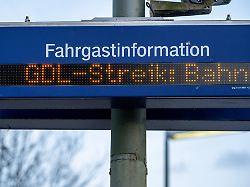Long GDL strike criticized
Ramelow takes Weselsky’s side
January 25, 2024, 12:10 a.m
Listen to article
This audio version was artificially generated. More info | Send feedback
Is Deutsche Bahn pursuing the goal of “destroying” the GDL? At least Thuringia’s Prime Minister Ramelow has this suspicion with regard to the escalated collective bargaining dispute. He sees no “arbitrable offer.” Other politicians are harsher against the union.
Thuringia’s Prime Minister Bodo Ramelow has blamed Deutsche Bahn for the escalation of the collective bargaining dispute with the train drivers’ union (GDL). “I don’t understand at all what the railway’s strategy is,” he told the editorial network Germany (RND) with a view to the ongoing strike. “There is no arbitrable offer.” Instead, the railway board repeatedly tries to take legal action against the GDL.
“The goal is apparently to destroy the GDL,” said the left-wing politician. “But that makes them even more of a fighting organization. I can only shake my head in amazement.” Ramelow, together with SPD politician Matthias Platzeck, settled the long wage dispute between the railways and the GDL in 2015. He and Platzeck were also appointed as arbitrators in 2017.
Meanwhile, GDL boss Claus Weselsky rejected criticism of the length of the rail strike. “That’s proportionate, that’s permissible, that’s legal. That’s what the court decided,” Weselsky told “Stern”. He sees the responsibility for the situation and the strike as lying with the management of Deutsche Bahn: “It is not the railway workers who are responsible for the system being in ruins. That is the responsibility of the management.”
Union boss Weselsky also rejects the railway’s new offer: “We are met with a few millimeters. We see that the 37 hours per week are offered, but are equally restricted: namely when there are not enough staff. We don’t negotiate like that. Besides “The offer contains a whole series of counter-demands that worsen the current tariff system because they make people more flexible.”
“A solution must be found at the negotiating table”
The federal government’s rail commissioner, Michael Theurer, however, warned of consequences for the transport turnaround because of the GDL rail strike. “With new and ever-longer strikes, the climate-friendly mode of transport, rail, is becoming increasingly less attractive,” said the Parliamentary State Secretary in the Federal Ministry of Transport to the RND. “Anyone who has previously considered switching from the car to the train now has another counter-argument,” added the liberal. “It’s playing with fire.”
Theurer called on the train drivers’ union and the railway company to negotiate. “I therefore expect the collective bargaining partners to approach each other, possibly supported by an arbitration procedure between the GDL and Deutsche Bahn. A solution must be found at the negotiating table,” demanded the FDP politician.
The head of the Conference of Transport Ministers, NRW Transport Minister Oliver Krischer, was alarmed about the impact on the economy. “The strike hits commuters as well as the economy to the core,” said the Green politician to the RND. “This puts further strain on the rail system and is diametrically opposed to the goal of transporting more people and goods by rail.”
Krischer emphasized that he had “no understanding” for a six-day strike without serious negotiations. “It seems to me that the positions are by no means unbridgeable. That’s why everyone should go back to the negotiating table to find a solution quickly,” demanded the state minister.
